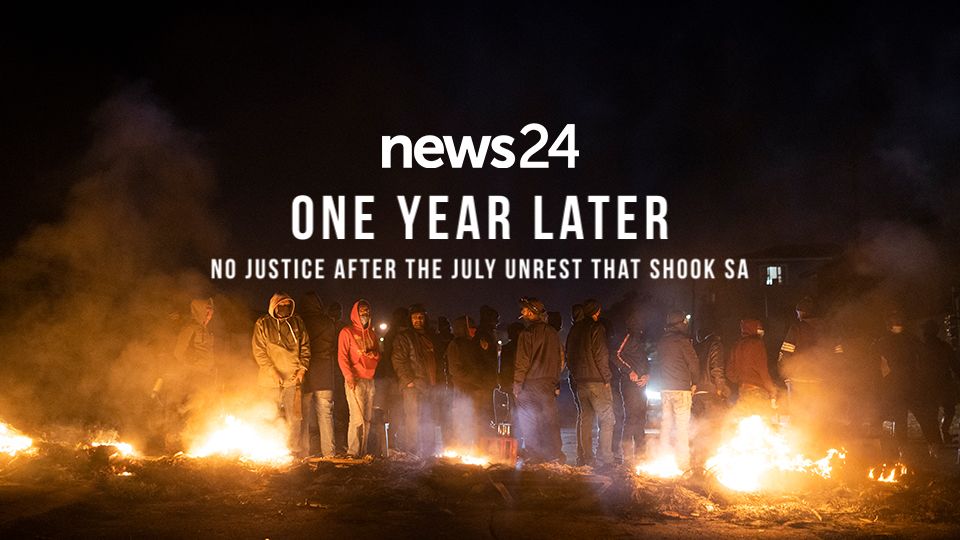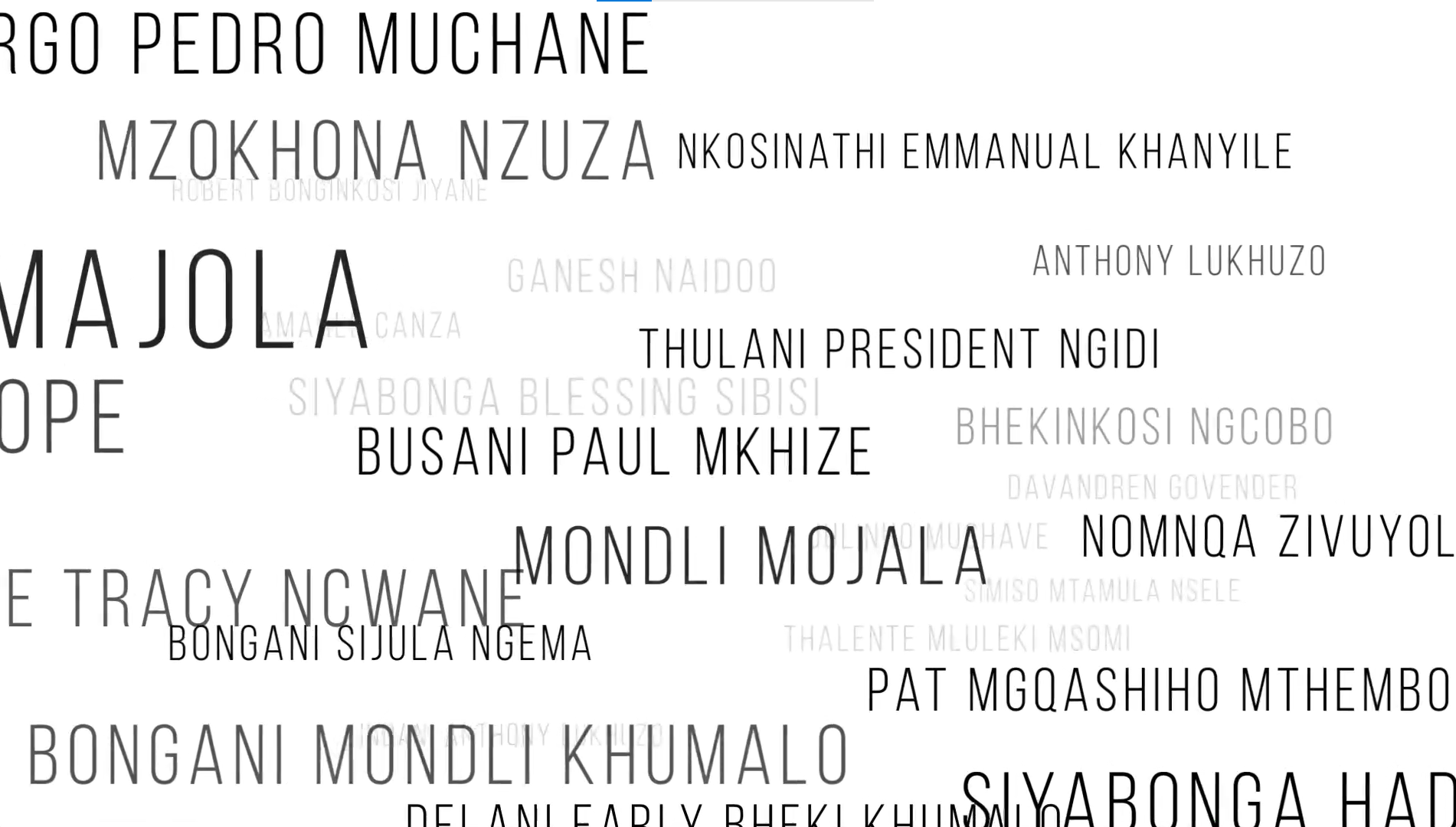
One year later, the families who lost loved ones in the July unrest that rocked South Africa following the imprisonment of former president Jacob Zuma have realised the system has failed them.
They have yet to see justice for their children, elders, brothers, sisters, breadwinners and soul mates. Yet those who masterminded the violence, encouraged it and celebrated it for all to see, still enjoy freedom as one of the darkest days in South Africa's post-apartheid history seems doomed to become lost to memory.
A News24 investigation, done over two months, set out to identify those who died in the violence that ensued last year in KwaZulu-Natal and Gauteng when Zuma was arrested. We did this to remember those who lost their lives in the mayhem, whose names have not been uttered by any leadership to the public, condemned to be lost to history like the violence itself.
Families in KwaZulu-Natal and Gauteng still wait to hear of the arrest of those accused of killing their loved ones. And South Africa awaits accountability.
Reporting by Azarrah Karrim
Your support affords us the time and resources to produce rich, in-depth journalism that holds power to account.
'The police are failing us': One year after the July unrest, victims' families, and SA, are still in the dark
The hope of justice for the families who lost loved ones in the riots that swept through KwaZulu-Natal and Gauteng in July last year has seemingly slipped out of reach as cases go cold and prominent instigators remain untouched.
One year ago, former president Jacob Zuma handed himself over for imprisonment after being found guilty of contempt of court for refusing to appear before the Zondo Commission.
Zuma's incarceration at Estcourt Prison set in motion a series of destructive, coordinated events that threatened to rip South Africa apart. Despite the names of prominent politicians and intelligence operatives being mentioned in law enforcement circles, South Africans are none the wiser about who exactly masterminded the eight days of mayhem that threatened the country's stability.
As crime scenes decay, witnesses disappear and evidence vanishes, the truth slips out of reach.
News24 spent two months identifying those who died in the unrest, collating a list of 72 names of victims who died in KwaZulu-Natal and Gauteng – names which have previously not been made public.
We spoke to ward councillors, political party members, community activists, government and provincial departments to assess the progress of reparations for those who suffered and to remember those who lost their lives in one of South Africa's darkest weeks.
Of the 72 names News24 collated, we spoke to 31 families for an update on their cases. While five people declined to comment, only three said they were informed that police had made arrests. The dismal progress towards accountability has left families with a grim outlook, that "police are failing us".




Stillborn investigations, no prosecutions and lost hope for Phoenix victims
Criminal investigations into the extrajudicial killings that left 40 people dead in Phoenix in July last year, have become dormant and only three cases are before court.
There is now a real prospect that justice is out of reach for those who were murdered during the wave of unrest. The families of those slain in the racially charged battle that gripped the suburb and the areas around it have come to this grim resolution. They say "there is nothing we can do".
News24 visited the murder scenes as well as the sites where looters stripped shopping complexes bare after the incarceration of former president Jacob Zuma.
In Phoenix, KwaMashu, Inanda, Bhambayi, Zwelisha, Verulam, Lindelani, Newlands, and Quarry Heights, we identified those who died when groups were pitted against each other along racial lines.
News24 collated a list of 40 names whose cases were registered in Phoenix. Twenty-one family members of the 40 people spoke to News24. Only three were informed that someone had been arrested. The same accused was involved in two of the cases. Two did not wish to comment.
After the killings, Police Minister Bheki Cele put together a team of detectives and blustered on about consequences and the rule of law. One year later, police have refused to release details of the murders and they have insisted that "ongoing" investigations could be harmed.
The National Prosecuting Authority said only three cases proceeded to trial.


Phoenix tries to rise from the ashes as reconciliation efforts continue
Families of those who were murdered in the Phoenix bloodbath during the peak of the unrest in KwaZulu-Natal in July last year say they still feel the anger and unease that the tragedy left behind a year ago between Indian and African residents.
Although social cohesion is possible, the families and community activists say the government needs to take steps to compensate residents who lost loved ones, and that Indian residents need to acknowledge the tragedy.
News24 collated a list of 40 people who were killed along Phoenix's main access points last year when residents took up arms under the guise of protecting their properties. Phoenix became the epicentre of the unrest, accounting for about 10% of deaths nationwide. Three Indian people were killed in the area and the rest were black residents. It left deep-seated scars in the community and there's been an uphill battle to mend the wounds.
One year after the unrest left a R50 billion dent in the economy and thousands of job losses, News24 visited families who lost their fathers, brothers and sisters in Phoenix, KwaMashu, Inanda, Bhambayi, Zwelisha, Verulam, Lindelani, Newlands and Quarry Heights. We identified those who lost their lives when discord was sown into an already fragile community and spoke to 25 families and community activists about race relations. Their sentiments were the same: that the government and authorities had failed them.
Their emotions were undercut by the slow pace of justice for those who died, dwindling arrests, almost no prosecutions, a business-as-usual attitude from authorities and the government, and continued, unaddressed economic disparities in the communities.


One KwaMashu woman's mission to get justice for her dead uncle
The death of Mbuyazwe Zondi at the age of 67 in Phoenix, KwaZulu-Natal, during the July unrest last year has left his family desperately seeking answers.
His niece, Khanyilise Zondi, 66, believes it smacks of a cover-up and has spent the last few months trying to have her uncle's body exhumed. But a cash exchange, rushed burial, no post-mortem, no investigation, and a dodgy death certificate left her with no answers as to what really happened.
News24 spoke to dozens of families who lost loved ones in the unrest, and one year later, they had still not received an update from police on the cases.
News24 collated a list of 40 people who died in the unrest in the area, and 21 family members spoke to News24. Of the 21 relatives, only three were aware of an arrest in their case, and two of those were the same accused. In KwaZulu-Natal, only three cases have been enrolled for prosecution.
News24 met with Khanyilise at her home in KwaMashu. She had meticulously kept detailed notes and documents relating to her uncle's death and the police investigation in the hope she would find answers.

EDITORIAL
The July unrest masterminds are hiding in plain sight
One year later, it is abundantly clear that the state has failed dismally to hold to account those who almost brought South Africa to its knees.
A year ago, President Cyril Ramaphosa went on live TV, flanked by the heads of the police and the defence force, and announced that South Africa was the victim of a failed insurrection.
An insurrection is a nice word for a coup d'état. What Ramaphosa was effectively telling us was that people were attempting to overthrow the government. This is serious stuff and you would have expected the state to throw everything at its efforts to get the perpetrators behind bars.
This didn't happen. Instead, some auxiliary figures, like a hateful radio DJ and a crude local councillor, were arrested, and their arrests will be trumpeted by the government as successes of their attempts to find the instigators of the violence that left 354 people dead.
A News24 investigation could find only three murder trials.
The real masterminds of the violence are at large and hiding in plain sight.
Duduzile Zuma-Sambudla, former president Jacob Zuma's daughter, is a case in point. From the comfort of her father's state-sponsored abode in Nkandla, she tweeted hateful messages and images in the days leading up to the July unrest and continues to do so. Yet, there have been no consequences.
Our battered intelligence services already knew of the involvement of former State Security Agency (SSA) operatives last year, yet they remain untouched.
The Hawks have been investigating prominent ANC politicians and businesspeople for months. They include a prominent former Gauteng mayor, ministers and former premiers. Yet, there have been no arrests.
It raises this uncomfortable question: why isn't the state arresting the real instigators of the "failed insurrection"? Is there, yet again, political meddling in the affairs of our law enforcement agencies, as happened during the Zuma era? Is the price too high for the ANC to arrest its own and admit the enemy is within, rather than some outside third force?
There should be zero tolerance for political meddling by the police, the Hawks included, and the National Prosecuting Authority. The country is looking to advocate Shamila Batohi and General Fannie Masemola to do the right thing – soon.

Remembering their names

Our journalists don't stop until they get to the truth. Your support equips them for the fight.
IN OPINION

Billions of rands, thousands of businesses: A year on, experts unpack 'shattering' July riots

WEBINAR | One year since the July unrest: News24 journalists take stock of the aftermath

The best of our unrest coverage

Anatomy of a violent July: Data mapping shows unrest was part of tactical plan to shut down SA

No money, no idea: SAPS intelligence failed to warn of ‘insurrection’ because of budget crisis

Inside Nkandla: How Dudu Myeni’s frantic call to police chief paved way for Zuma arrest

Phoenix killings: New data suggests Indians, homes were never the target in face of race killings

Data investigation: The 'strategy' behind road closures during the unrest in KwaZulu-Natal

First warnings of chaos came two months before KZN, Gauteng were crippled by July unrest

To our subscribers: Your support enables us to fight injustice and give a voice to the voiceless. Thank you.
Additional contributors:
Edited by Adriaan Basson. Multimedia by Aljoscha Kohlstock and Bertram Malgas. Production by Kelly Anderson.





